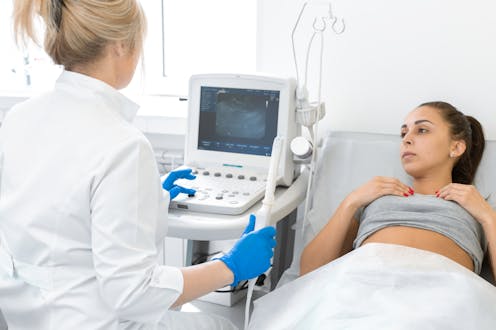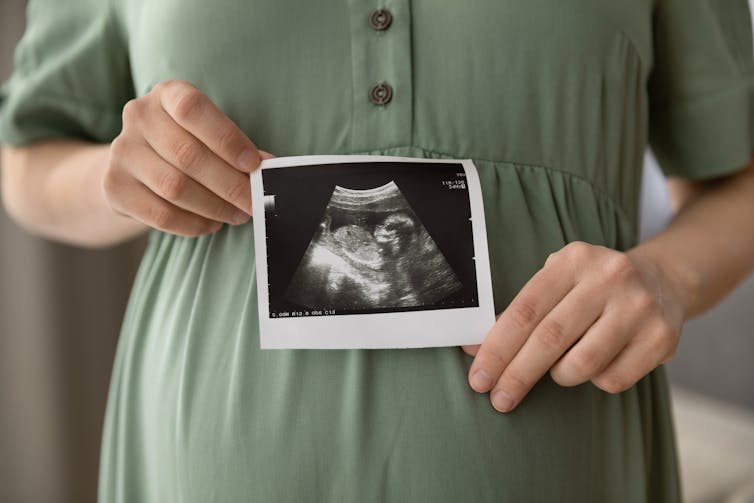 Shutterstock
ShutterstockRecent media coverage in the Nine newspapers highlights a surge in non-medical ultrasound providers offering “reassurance ultrasounds” to expectant parents.
The service has resulted in serious harms, such as misdiagnosed ectopic pregnancies and undetected fetal abnormalities, according to the reports.
So why do some women choose additional ultrasounds? And how can you tell if you should trust the person providing your ultrasound?
What are reassurance scans?
Reassurance scans are a type of non-medical elective or “entertainment” ultrasound some women seek in addition to their routine first- and second-trimester scans.
Reassurance scans are marketed as a way to “give you peace of mind” about your baby’s development, or to assure you “everything is progressing as it should” if you’re not due for a routine scan.
They’re also called souvenir, boutique or keepsake ultrasounds, because these business typically sell memento packages. These often include so-called 4D images: renderings combined with the fourth dimension of time to show movement.
Some businesses offer gender identification information, sometimes with “gender-reveal” party accessories, as well as audio recordings of the fetal heartbeat.
Why do women get them?
Detailed interview studies have explored why ultrasound images beyond the routine scans are so popular.
Many expecting parents want to learn the fetal sex as early as possible, seek reassurance, see the facial features of their future child and acquire keepsake images.
Others find the routine scans too rushed and impersonal, turning to commercial providers as a more ceremonious and fulfilling ritual.
 Some women feel rushed during routine scans.
Jordi Mora/Shutterstock
Some women feel rushed during routine scans.
Jordi Mora/Shutterstock
Health sociologists have emphasised the positive health impacts of non-medical ultrasound, which can help expecting mothers and fathers bond with their baby.
Some feminists in the 20th century criticised the medicalisation of pregnancy for devaluing “lived experience”. But recent feminist accounts have re-framed non-medical scans as a way for women to get health care that goes beyond clinical utility.
Rather than trivialising the “entertainment” value of these services, some argue obstetricians could learn from the service, thus improving patient satisfaction during obstetric imaging.
What are the risks of these services?
In recent years, the technology to provide detailed scans has become more portable, with handheld, smartphone-compatible ultrasound devices now available.
This, along with the normalisation of sharing ultrasound images on social media, has likely led to more commercial businesses offering these services.
Yet the service is considered fraught with unmanageable psychological and social risk. Providers are usually not trained to counsel mothers or families should a fetal anomaly be suspected.
Professional organisations have denounced these businesses for misleading consumers with false reassurances. As these scans aren’t checked by a clinician, these operators cannot give reliable assurances.
The World Federation for Ultrasound in Medicine and Biology and similar bodies disapprove of souvenir ultrasounds on safety grounds. So too does the Australian Sonographers Association, which represents about 70% of sonographers.
No substantive restrictions on ultrasound devices
Australia’s Therapeutic Goods Administration regulates the supply of medical devices. It registers them, classifies them according to their risk and sometimes attaches conditions to their use.
However, some portable ultrasound scanners approved as low-risk devices carry no specific conditions. Lay consumers could theoretically purchase them, including through the personal importation scheme.
Last year, the TGA de-registered several handheld devices used to detect fetal heartbeats during pregnancy without health practitioner supervision.
The decision followed a post-market review that found expectant parents had been falsely reassured by the devices themselves or by untrained people using them in home settings.
However, no such review has been conducted for portable ultrasound devices.
While removing devices from the register in this manner may limit consumer access, it is not a “product recall” and would not prevent the continued sale of second-hand devices.
 These days it’s normal to share ultrasound images on social media.
fizkes/Shutterstock
These days it’s normal to share ultrasound images on social media.
fizkes/Shutterstock
Who can perform ultrasounds?
While some specialist health practitioners may perform ultrasounds (such as obstetricians holding a relevant certificate), most diagnostic imaging specialists are sonographers.
To perform medical ultrasounds that are eligible for a Medicare rebate, sonographers must be trained and accredited.
But there is no sonography registration board to receive complaints about sonographers or take disciplinary action against them. This sets sonographers apart from registered health practitioners such as doctors, nurses and pharmacists.
The Australian Sonographers Association has argued sonographers should be regulated by a registration board.
This could make sonographers more clearly identifiable through title protections, ensure poorly performing sonographers are disciplined and allow for consistent national standards.
However, it would not stop unregistered people from providing non-medical ultrasounds.
So how can you tell if your provider is a sonographer?
One clear signal that a provider is offering a non-diagnostic ultrasound is that no Medicare subsidy is on offer.
Australian providers conducting imaging without accreditation must inform consumers of their non-accredited status and confirm no Medicare benefit is payable.
Not doing so would amount to an offence.
How can you report a dodgy provider?
You can make complaints to state-based health complaints bodies. The Health Care Complaints Commission in New South Wales, for example, can investigate complaints about sonographers as non-registered health practitioners and consider the relevant code of conduct.
When a sonographer is found to have acted improperly, or to pose a health or safety risk, these complaints bodies may issue orders prohibiting the sonographer from providing any health services for a specified period.
Australian consumer law is another way authorities may crack down on unscrupulous providers. In 2015, a person was prosecuted in Western Australia after selling identical images to six women who received non-medical ultrasounds in their homes.
Her offences involved making false or misleading claims and accepting money for services not provided.
If non-medical imaging providers make misleading claims, including about the level of clinical reassurance a non-diagnostic scan can provide, you can report them to the Australian Consumer and Competition Commission.
The author was employed as a research officer at the Medical Council of New South Wales in 2018.

 3 months ago
516
3 months ago
516 
















 English (United States) ·
English (United States) ·